Should Murderers Be Stoned to Death?
There is a lot of truth in theonomy. But things have changed since the time of Moses. At that point, the church and state were basically one.
After the exile, things were different. The role of the Jews was to be priests within the Gentile state. They no longer had the right to administer capital punishment. When they witnessed faithfully, there was a Jew at the emperor’s right hand, steering the empire for God’s people and their stand for the truth.
By the time of Christ, instead of a Joseph, Daniel or Mordecai, the Jews had a Haman, a Herod. Instead of being a nation of priests, they wanted a king like the Gentiles. This makes Herod even more culpable for his role in the death of Christ, standing (legally) at the right hand of the power.
I believe the church today is exactly the same. The church administers ‘inhouse’ justice through excommunication. When the church is faithful in disciplining itself, and thus witnesses faithfully, it stands side by side with the state in administering capital punishment. Our failure to witness has led to ‘life’ for murderers and death for the innocent.
The Bible is clear on the shedding of innocent blood. A murderer dies to atone for the blood he shed. It is judicial. Correlating capital punishment with abortion is a total misunderstanding of justice.
As in AD70, perhaps all the innocent blood shed in this gospel age will be atoned for by the final generation. The murderers are marked like Cain for now, but Abel’s blood will be atoned for.



























